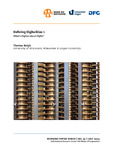Citation link:
http://dx.doi.org/10.25819/ubsi/10259Files in This Item:
| File | Description | Size | Format | |
|---|---|---|---|---|
| Haigh_Thomas_Defining_Digitalities_I.pdf | 6.23 MB | Adobe PDF |  View/Open |
| Dokument Type: | Book | metadata.dc.title: | Defining digitalities I | Title addition: | What’s digital about digits? | Authors: | Haigh, Thomas | Institute: | DFG-Sonderforschungsbereich 1187 "Medien der Kooperation" | Free keywords: | Digital, Analog, Binary, Differential analyzer, Bell Labs | Dewey Decimal Classification: | 302.23 Medien (Kommunikationsmittel), Medienwissenschaft | GHBS-Clases: | KNZT | Issue Date: | 2023 | Publish Date: | 2023 | Series/Report no.: | Working paper series / SFB 1187 Medien der Kooperation | Abstract: | Modern discourses emphasizes electronic immateriality as the defining feature of digital technology. The idea that digits might be digital when punched onto cards, or even written on a piece of pa- per, is no longer intuitive. Yet by reconstructing the context in which the categories of digital and analog were first distinguished histori- cally in the 1940s, I argue that the concept of digitality is rooted in the mechanical representation of digits in early computers, which con- temporary observers immediately recognized was shared with earlier technologies such as telephone switching systems, punched cards, and calculating devices. Digitality is not a feature of an object itself, but of the way that object is read (whether by human or by machine) as encoding symbols chosen from a finite set. In conclusion, digitality is constituted through reading practices. |
DOI: | http://dx.doi.org/10.25819/ubsi/10259 | URN: | urn:nbn:de:hbz:467-24526 | URI: | https://dspace.ub.uni-siegen.de/handle/ubsi/2452 | License: | http://creativecommons.org/licenses/by-nc-nd/4.0/ |
| Appears in Collections: | Publikationen aus der Universität Siegen |
This item is protected by original copyright |
Page view(s)
346
checked on Apr 4, 2025
Download(s)
153
checked on Apr 4, 2025
Google ScholarTM
Check
Altmetric
This item is licensed under a Creative Commons License


